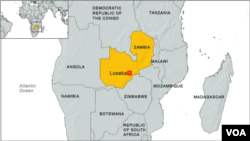In Zambia, police have arrested more than 250 people following two days of attacks on foreigners in the capital, Lusaka. The violence this week was sparked by rumors that foreigners had carried out ritual killings; but, local civil society groups say people are looking for scapegoats amid anger over the rising cost of living and other economic issues.
Zambian police have deployed more than 2,000 officers to maintain order. According to police and officials, the looters targeted both foreign and locally-owned shops.
Police spokeswoman Charity Munganga told VOA that arrests have been made.
“We’ve arrested 262 suspects in connection with the looting and then we have also had 11 suspects in custody in connection with the alleged ritual killings. So right now it has nothing to do with foreigners but it's people who have taken advantage of the situation,” he said.
Munganga noted the suspects thought to be behind the alleged killings were not foreigners.
“These 11 suspects are Zambians. We are not giving any details because this case is still under investigation, but once we are done with our investigations, we will give out their names and give out exactly what we found them with,” Munganga said.
Ritual killings are a problem in parts of Africa where some people believe magic potions or ceremonies can bring them success in business and life.
Poverty, lack of opportunity
Maxon Nkhoma of Civil Society for Poverty in Zambia says poverty and a lack of opportunity are the real cause of the violence against business owners.
“Poverty is being manifested through these attacks targeting at shops belonging to foreigners because this attacks - individual foreigners are not targeted but their shops. When you see people walking out of these shops, it's either they have carried a bag of Mielie-meal and sugar - these basic food items.”
The copper-rich African country is facing economic challenges because of the fall in the price of copper. Copper accounts for two-thirds of the country’s export earnings. Meanwhile, the price of essential commodities has gone up by 20 percent.
A Rwandan business owner in Lusaka told VOA’s Central African Service that locals are not a happy lot.
“The thing which is being talked about by the natives, they are talking about Rwandans taking a big part in business, having a lot of shares and having a lot of money, to the extent of [Zambians] not having food and enough jobs,” he said.
Zambia has long hosted thousands of refugees from Rwanda and other nearby countries, but this is the first time the country has seen large-scale attacks on foreigners.





